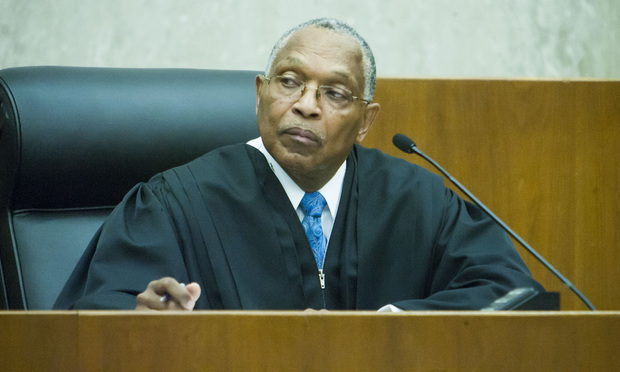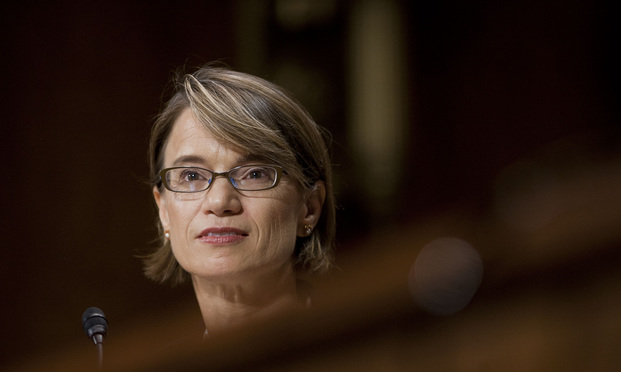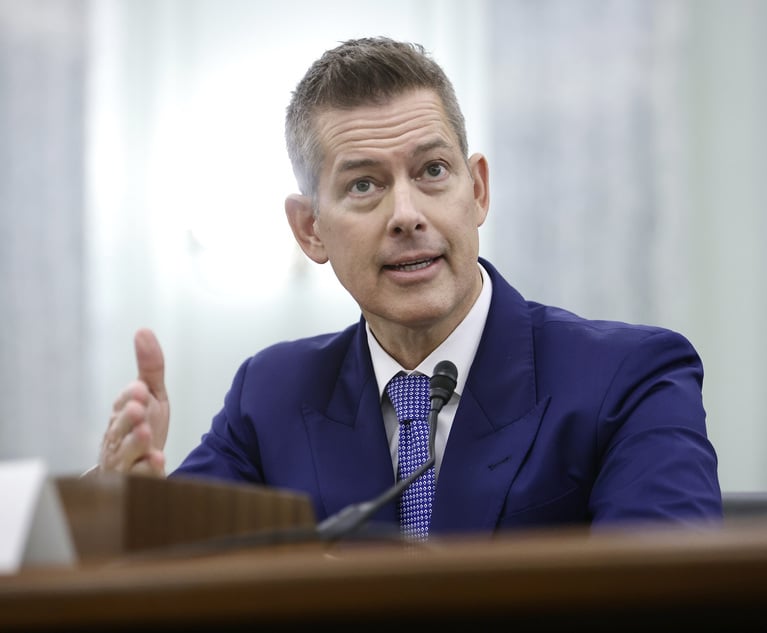Judge Blocks Further Inquiries in FOIA Case Questioning Hillary Clinton's Email Practices
"I find it hard from a practical perspective to believe that somehow [State Department officials] have not done their duty in trying to find records that relate to Secretary Clinton," U.S. District Judge Reggie Walton said at a recent hearing in the public records case.
July 17, 2020 at 11:28 AM
5 minute read
 Judge Reggie Walton of the U.S. District Court for the District of Columbia. (Photo: Diego M. Radzinschi/ALM).
Judge Reggie Walton of the U.S. District Court for the District of Columbia. (Photo: Diego M. Radzinschi/ALM).
A federal judge in Washington on Friday refused to further prolong a public-records case that has raised questions about Hillary Clinton's use of a private email server during her service as U.S. secretary of state during the Obama administration.
The plaintiffs in the lawsuit had urged District Judge Reggie Walton to allow "discovery" in an effort to find any additional records that might be related to an advertisement that the U.S. embassy in Islamabad produced that was titled "A Message from the President of the United States Barack Obama and Secretary of State Hillary Clinton."
Walton's order on Friday said the demand for additional discovery by the plaintiffs—Judicial Watch, the conservative advocacy group, brought the suit in 2012—was "speculative and insufficient to delay summary judgment briefing any further."
At a court hearing last week in the case, Walton pointed to other cases involving Clinton-era State Department records and searches, and he noted that the State Department has asserted that it has "already obtained and searched all of Secretary Clinton's emails."
Walton said he could not imagine any effort at the Trump-led State Department to conceal records involving Clinton.
"Seems to me they would be readily prepared to produce them," Walton said. "I find it hard from a practical perspective to believe that somehow they have not done their duty in trying to find records that relate to Secretary Clinton, considering the political realities of who occupies now the White House and runs the State Department."
The Judicial Watch case is one of several pending public-records disputes focused on Clinton's leadership of the State Department.
A federal appeals court in Washington is tied up in one of those other cases, weighing whether to force Clinton to sit for a deposition about her email practices—the use of a private email server—during her tenure as secretary of state.
The U.S. Court of Appeals for the D.C. Circuit heard arguments last month over the would-be Clinton deposition. The court did not seem inclined to uphold a trial judge's order requiring Clinton to sit for the deposition. Depositions of current or former Cabinet officials are rare.
 Judge Cornelia Pillard of the U.S. Court of Appeals for the D.C. Circuit. (Photo: Diego M. Radzinschi / ALM)
Judge Cornelia Pillard of the U.S. Court of Appeals for the D.C. Circuit. (Photo: Diego M. Radzinschi / ALM)The appeals court questioned, as Walton had in the case before him, whether there's anything left to find, and why the State Department, under the leadership of Trump appointees, would have any reason to impede the release of any records that haven't been previously released to the public.
"The State Department now has every incentive to get to the bottom of this if you have any questions, if that's the case," D.C. Circuit Judge Cornelia Pillard said during one exchange. "This is no longer Secretary Clinton's State Department, this is the Trump State Department."
Justice Department lawyers, pointing to those other pending or resolved public-records cases, resisted Judicial Watch's effort to continue pressing State to search for any additional responsive records in the suit over the advertisement.
"In the almost four years since this case was stayed, Judicial Watch has conducted extensive discovery in two similar FOIA cases, and has the benefit of the facts and conclusions reached in investigations by the Federal Bureau of Investigation, the Department of Justice Office of the Inspector General, the Department of State, Office of Inspector General, and Congress, into former Secretary Clinton's email practices," Justice Department lawyers said in a court filing in April.
Judicial Watch lawyers had argued their request for additional discovery was not "unnecessary, duplicative, or burdensome."
"The State Department was still finding new batches of previously undisclosed emails from Secretary Clinton as recently as late last year, so defendant is in no position to assert with any confidence that it will not be finding additional new emails later this year," Judicial Watch lawyers told Walton in a court filing in May.
At the hearing last week in the advertisement case, Walton noted that discovery in Freedom of Information Act cases is rare and should only be allowed when there's "reasonable belief" that new searches would yield additional responsive documents.
"I'm hard pressed to include—in light of precedents regarding the propriety of conducting discovery in this type of litigation—to permit that discovery to occur," Walton said at the court hearing. "This is an old case. We need to at some point bring it to a final conclusion."
Walton set a status conference for December.
Read more:
'This Is No Longer Clinton's State Department': Judges Wary of Deposition Over Emails
DC Circuit Tells Lawyers in Clinton Emails Case: What's Left to Resolve?
US Justice Dept. Opposes Hillary Clinton's Challenge to Rare Deposition Order
Hillary Clinton's Appeal Argues No 'Extraordinary Circumstances' Justify Deposition
'Extraordinary Circumstances': Brief History of Top Federal Officials Ordered to Testify
This content has been archived. It is available through our partners, LexisNexis® and Bloomberg Law.
To view this content, please continue to their sites.
Not a Lexis Subscriber?
Subscribe Now
Not a Bloomberg Law Subscriber?
Subscribe Now
NOT FOR REPRINT
© 2025 ALM Global, LLC, All Rights Reserved. Request academic re-use from www.copyright.com. All other uses, submit a request to [email protected]. For more information visit Asset & Logo Licensing.
You Might Like
View All
Apple Files Appeal to DC Circuit Aiming to Intervene in Google Search Monopoly Case
3 minute read

DOT Moves to Roll Back Emissions Rules, Eliminate DEI Programs

Trending Stories
- 1The TikTokification of the Courtroom
- 2New Jersey’s Arbitration Appeal Deadline—A Call for Clarity
- 3Law Firms Look to Gen Z for AI Skills, as 'Data Becomes the Oil of Legal'
- 45th Circuit Strikes Down Law Barring Handgun Sales to Adults Under 21
- 5Commonwealth Court Overturns Zoning Board’s Denial Based on Merger Doctrine and Unnecessary Hardship Questions
Who Got The Work
J. Brugh Lower of Gibbons has entered an appearance for industrial equipment supplier Devco Corporation in a pending trademark infringement lawsuit. The suit, accusing the defendant of selling knock-off Graco products, was filed Dec. 18 in New Jersey District Court by Rivkin Radler on behalf of Graco Inc. and Graco Minnesota. The case, assigned to U.S. District Judge Zahid N. Quraishi, is 3:24-cv-11294, Graco Inc. et al v. Devco Corporation.
Who Got The Work
Rebecca Maller-Stein and Kent A. Yalowitz of Arnold & Porter Kaye Scholer have entered their appearances for Hanaco Venture Capital and its executives, Lior Prosor and David Frankel, in a pending securities lawsuit. The action, filed on Dec. 24 in New York Southern District Court by Zell, Aron & Co. on behalf of Goldeneye Advisors, accuses the defendants of negligently and fraudulently managing the plaintiff's $1 million investment. The case, assigned to U.S. District Judge Vernon S. Broderick, is 1:24-cv-09918, Goldeneye Advisors, LLC v. Hanaco Venture Capital, Ltd. et al.
Who Got The Work
Attorneys from A&O Shearman has stepped in as defense counsel for Toronto-Dominion Bank and other defendants in a pending securities class action. The suit, filed Dec. 11 in New York Southern District Court by Bleichmar Fonti & Auld, accuses the defendants of concealing the bank's 'pervasive' deficiencies in regards to its compliance with the Bank Secrecy Act and the quality of its anti-money laundering controls. The case, assigned to U.S. District Judge Arun Subramanian, is 1:24-cv-09445, Gonzalez v. The Toronto-Dominion Bank et al.
Who Got The Work
Crown Castle International, a Pennsylvania company providing shared communications infrastructure, has turned to Luke D. Wolf of Gordon Rees Scully Mansukhani to fend off a pending breach-of-contract lawsuit. The court action, filed Nov. 25 in Michigan Eastern District Court by Hooper Hathaway PC on behalf of The Town Residences LLC, accuses Crown Castle of failing to transfer approximately $30,000 in utility payments from T-Mobile in breach of a roof-top lease and assignment agreement. The case, assigned to U.S. District Judge Susan K. Declercq, is 2:24-cv-13131, The Town Residences LLC v. T-Mobile US, Inc. et al.
Who Got The Work
Wilfred P. Coronato and Daniel M. Schwartz of McCarter & English have stepped in as defense counsel to Electrolux Home Products Inc. in a pending product liability lawsuit. The court action, filed Nov. 26 in New York Eastern District Court by Poulos Lopiccolo PC and Nagel Rice LLP on behalf of David Stern, alleges that the defendant's refrigerators’ drawers and shelving repeatedly break and fall apart within months after purchase. The case, assigned to U.S. District Judge Joan M. Azrack, is 2:24-cv-08204, Stern v. Electrolux Home Products, Inc.
Featured Firms
Law Offices of Gary Martin Hays & Associates, P.C.
(470) 294-1674
Law Offices of Mark E. Salomone
(857) 444-6468
Smith & Hassler
(713) 739-1250








